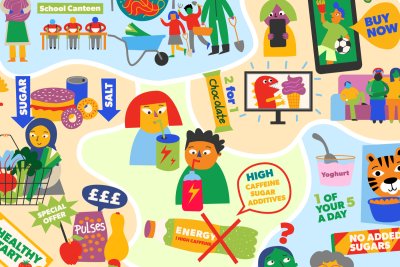News • Children's Food Campaign
Campaigners slam OFCOM secrecy and spin
The Children's Food Bill coalition has slammed the communications
regulator Ofcom for their secrecy over the results of their consultation
on junk food advertising aimed at children.
Ofcom has refused to answer a Freedom of Information request to let us
know: . the number of consultation responses that, in some form, called
for tighter restrictions than Ofcom currently propose? . the number of
consultation responses that call for some kind of restrictions on junk
food advertising before the 9pm watershed?
Ofcom claims it is refusing to reveal the information because it may
wish to release this data later in the year.
Richard Watts, Campaign Co-ordinator for the Children's Food Bill, said:
"We are very disappointed that Ofcom is trying to hide behind a veil of
secrecy. The public has a right to know what responses Ofcom received
to this important consultation, which has serious consequences for
children's health."
He added: "I can only conclude that Ofcom wants to keep this information
secret so it can spin the results in an announcement later in the year.
It seems like it is looking for a good day to bury bad news. It has
mishandled this consultation at every step of the way. It is time the
Government took this important decision away from Ofcom's fumbling hands
and introduce legislation, supported by parents and public health
professionals, to protect children from junk food adverts before 9pm."
Ofcom has been criticised by campaigners already for spinning
inconvenient facts in their consultation document on junk food TV
advertising. One example of this spin is an opinion poll which showed
that 48% of the public support a 9pm watershed for junk food adverts,
compared to 24% in opposition. While an independent reader might
interpret this as relatively strong support for a 9pm watershed it was,
according to Ofcom, a sign that "parents do not favour a ban on [junk]
food advertising before 9pm".
Ends.
Notes to Editors:
1. The quote that "parents do no favour a ban on [junk] food
advertising before 9pm" comes form paragraph 1.27 of Ofcom's
consultation document. A recent poll by TNS and the British Heart
Foundation found that 68% of parents support a 9pm watershed for junk
food adverts, with only 7% opposing.
2. A Freedom of Information request in April this year from the
Children's Food Bill campaign found that Ofcom had met with industry
groups 118 times as they prepared their weak recommendations on junk
food advertising, compared to just 18 meetings with health and consumer
groups.
3. 114 MPs from all parties signed a Commons' motion which
expressed disappointment that Ofcom ruled-out protecting children from
junk food television advertisements before the 9 p.m. watershed as
disproportionate; called on Ofcom to attach greater weight to the health
and well-being of young people, as well as to give the option of ending
junk food television advertising before the 9 p.m. watershed equal
consideration in its consultation. (EDM 2278).
4. Other complaints about the Ofcom consultation include:
- Its definition of 'proportionality' is not explained, but apparently values the interests of the TV and food industries more highly than children's health.
- It excludes the option of banning junk food adverts before the 9pm watershed, despite widespread support. This breaks the Government's code of practice on consulting.
- It fails to meet the Government's requirements. By prohibiting the promotion of healthy foods, two out of their three substantive packages go against the Government's instructions to help broadcasters promote healthy living.
- It fails to apply the precautionary principle, despite being advised to do so by the Food Standards Agency, therefore public health concerns are not given the prominence they deserve.
- The rules for the content of adverts are designed to be 'unregulatable', largely because they have been drawn up by the advertisers.
- The definition of children is aged up to 9 years old, rather than the widely accepted legal definition of 16 years old. Again, there has been no justification for this.
5. The campaign for the Children's Food Bill is supported by over
285 MPs, 170 national organisations (including the BMA, National Heart
Forum, Cancer Research UK, the Royal College of Medicine and Unison) 135
local organisations and 12,000 members of the public. We call for
better school food, teaching basic cooking and food skills in school and
restricting marketing of junk food to kids.
Published Friday 4 August 2006
Children's Food Campaign: Better food and food teaching for children in schools, and protection of children from junk food marketing are the aims of Sustain's high-profile Children's Food Campaign. We also want clear food labelling that can be understood by everyone, including children.




